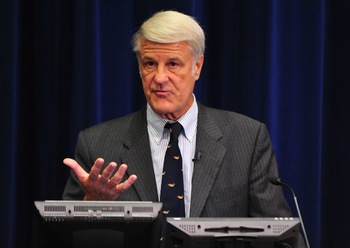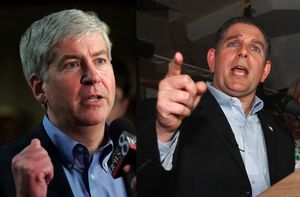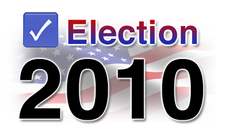A look at the 2010 elections in Michigan through the eyes of political expert Bill Ballenger
Michigan will continue to have a "split government" next year, says Bill Ballenger, the editor of Inside Michigan Politics and arguably the state's leading political pundit.
Democrats will retain control of the state House, and Republicans will maintain rule over the Senate. But for the first time in eight years, a Republican will take over the governor's office.
Ballenger offered those predictions, and his detailed reasons behind them, during a 2010 elections seminar Wednesday night on the campus of the University of Michigan.

Bill Ballenger, editor and publisher of Inside Michigan Politics, discusses the 2010 elections Wednesday night at the University of Michigan.
Ryan J. Stanton | AnnArbor.com
While neither chamber of the Legislature will see change in control, Ballenger said, Michigan automatically will usher in a brand-new state government come January.
And mostly that's because of term limits.
In addition to a new governor, Michigan will get a new lieutenant governor, secretary of state and attorney general. And at least 52 of the 110 seats in the House are guaranteed to be filled by new faces, while the same goes for 29 of the 38 seats in the Senate.
"If you think we've got problems with inexperience now up there, it's just going to get worse beginning in January," Ballenger said.
"But the good part of it is, I think there is a feeling out there in the public, in the electorate, that Michigan government is broken and screwed up, and the people that we've had doing the job have not been doing a good job, and let's start afresh, start new."
During a 30-minute speech followed by questions and answers, Ballenger pontificated on Michigan's changing political landscape, analyzed the gubernatorial matchup between Virg Bernero and Rick Snyder, and emphasized the high importance of a race most voters probably aren't paying attention to right now: The Michigan Supreme Court.
Ballenger also discussed two ballot proposals that will come before Michigan voters in November and what could happen to Michigan's Congressional delegation next year.
The Michigan Supreme Court
The Democrats now have a 4-3 hold on the Michigan Supreme Court after the recent resignation of a Republican justice, who was replaced with Democratic Justice Alton Davis.
Ballenger said whichever party controls the court next year will benefit greatly because the court has the power to influence the outcome of elections in Michigan for the next decade.
"What really makes it important this year is this is a Census year, so what happens next year and the year thereafter? Reapportioning," Ballenger said. "Redistricting of all the Congressional delegation, the entire state Senate, and the state House for the next decade."
Ballenger said redrawing district boundaries is a task reserved for the Legislature and the governor, but if they can't do it — and most of the time over the years they've deadlocked — the matter gets appealed to court, and it eventually finds its way to the Supreme Court.
"I've been following politics in this state for almost half a century. I have never seen anybody or any institution short of the Supreme Court decide what ultimately happens on these redistricting maps," Ballenger said. "And, by the way, they always rule in favor of whichever party controls the Supreme Court, even though they're nonpartisan."
Supreme Court justice candidates are nominated by their political parties at nominating conventions, which were held last month. The candidates then run nonpartisan campaigns, which means their actual party affiliation is not stated on the ballot.
Ballenger said that just means voters must do their homework before going to the polls. There will be five Supreme Court candidates on the ballot Nov. 2, and voters must pick two.
Davis, the Democrat who was just appointed to the bench, and Republican Justice Robert Young Jr. will run as incumbents. The other three candidates are Democrat Denise Langford Morris, Republican Mary Beth Kelly, and Libertarian Bob Roddis.
"The only thing that distinguishes Young and Davis, in particular, out of the three other people running for the court on Nov. 2, is they are the incumbents," Ballenger said. "And so they will actually have beneath their name, 'Justice of the Supreme Court.' And that's a big plus. That's worth its weight in electoral gold most of the time."
Ballenger predicts Young and Davis will win as a result of that, and the Democrats will maintain their current 4-3 control of the court.
Analyzing the gubernatorial matchup
Ballenger said this year marks the first time since 1930 that Michigan doesn't have either its governor or lieutenant governor running for the governorship, so it's a bit unusual.
The latest polls show Snyder, an Ann Arbor businessman, with a 20-plus point lead over Bernero, who currently serves as the mayor of Lansing.

Rick Snyder, left, is currently favored to win over Virg Bernero, right, in the Michigan gubernatorial race.
Ballenger said Bernero's biggest challenge is that he's not a household name — and among those who know about him, he's not very well-liked.
Further adding to Bernero's challenge, Ballenger said, is the fact that there have been only two mayors in the entire history of Michigan who have been elected governor.
"And they were both mayors of, as you might guess, Detroit," he said.
Ballenger said Snyder "bought the nomination" to win in the Republican primary, while Bernero benefited from labor unions who backed him over Andy Dillon. Snyder spent $7.6 million campaigning in the primary, finance reports showed.
Ballenger, who believes Snyder has a lot to lose by debating Bernero, said he doesn't blame Snyder for running away from debates. "He can get away with it, I think," he said.
Ballenger took exception Wednesday night when an audience member asked about Snyder's "moderate positions." Snyder has tried hard to convince voters he's not a traditional party-line Republican, but Ballenger said Snyder still remains rather ambiguous.
"When you get right down to it, all that I know of that shows that Rick Snyder might be a moderate, or more moderate than a lot of Republicans ... is that he supports stem cell research and that apparently he's not an avowed opponent of gay marriage," Ballenger said.
"I mean, these things are not issues in Lansing right now," he said. "There's not going to be any gay marriage controversy in Lansing next year. I can guarantee it. And as far as stem cell research, that's a settled issue. The voters approved it."
While Snyder has talked a lot about "reinventing Michigan," Ballenger said he has yet to hear specific proposals coming from the self-professed tough nerd.
"We don't really frankly know what Rick Snyder is going to exactly propose when it comes to the state budget and revenue and taxes and everything else," he said. "He's made some very broad statements — he said he doesn't like the Michigan Business Tax. Who does?
"Furthermore, we don't know that he has any differences with the rank-and-file Republican membership of the Legislature," Ballenger said. "So the idea that somehow he's some kind of George Romney striding into Lansing back in the '60s — and facing these troglodyte, knuckle-dragging farmers who are mired in the 19th century, and that he's going to whip them into shape quickly — there's no evidence of that. I don't see that."
Ballenger concluded Snyder "has got to fish or cut bait sooner or later" and be clear to the public and the news media about exactly what he's proposing as governor.
Republicans fight for control
Just because Snyder might win the governor's race, that doesn't necessarily mean the Republicans will win the races for attorney general and secretary of state, Ballenger said. For instance, in 2002, when Democrat Jennifer Granholm was first elected governor, Republicans won the attorney general and secretary of state races that year.

"There is speculation that this is going to be a good year for the Republicans, nationally and in Michigan," Ballenger said. "We don't know that is going to prove to be true necessarily in November. There's still six weeks to go, but all the polls indicate the Republicans at least are not going to take the drubbing that they did in 2008 and 2006."
The Republicans currently have a 22-16 stronghold in the state Senate, which means the Democrats would have to pick up four seats to take control.
In the state House, the Republicans are in their third weakest minority in the entire history of the party — since before the Civil War. They have only 42 members going into the election, while the Democrats have 65. There are three vacancies right now.
The Republicans would have to pick up 14 seats to get the majority. Ballenger said it's highly unlikely that would happen. Since 1996, GOP candidates have managed to take down only one incumbent Democrat in the state House, and that was in 2004.
"I predict they're going to fall short," Ballenger said. "They may make some gains. I think they may get up to maybe 50 seats, but they're still going to be in a 60-50 minority."
Michigan's Congressional delegation
All 15 of Michigan's representatives in Congress are on the ballot this year. The state's delegation currently includes eight Democrats and seven Republicans.
Ballenger said it's uncertain whether that ratio will change.
"We don't know what it's going to be like next year," he said. "It could be as high as 10-5 Republican. It could stay the same as it is right now. I don't think the Democrats can pick up a seat, but it's going to be very interesting to see what happens in November."
Michigan is guaranteed at least four new representatives in Congress beginning in January because of open seats and because one incumbent, Democrat Carolyn Cheeks Kilpatrick, was ousted in the August primary by state Sen. Hansen Clarke, D-Detroit.
Ballenger said even more new faces could emerge because there are two districts in particular — the 7th and 9th — where freshmen Democratic incumbents are vulnerable and could be defeated by their Republican rivals in November. The 7th and 9th district seats are held by Congressmen Mark Schauer and Gary Peters, respectively.
Ballenger said this likely will be the last year Michigan has 15 representatives in Congress. He expects the number to dip to 14 as a result of declines in the state's population.
Two statewide ballot proposals
Every 16 years, Michigan voters are asked if they want to hold a constitutional convention to place a new state constitution to a vote of the people.
Ballenger said that proposal will be on the Nov. 2 ballot, and it appears to be headed for defeat. He said the last two times the same proposal came before voters — in 1978 and 1994 — it was clobbered 3-to-1. The last constitutional convention was in 1961-62.
Ballenger noted it could cost anywhere from $50 million to $100 million to hold a constitutional convention, with no promise that it would deliver the results voters expect.
Another proposal placed on the ballot by the Legislature — referred to in Lansing as "the Kwame Kilpatrick amendment" — aims to ban certain felons from holding public office or other public employment in the state. The felonies involved would relate to dishonesty or breach of public trust while holding a public office within the previous 20 years.
Ballenger thinks that proposal will pass by a large margin.
Ryan J. Stanton covers government and politics for AnnArbor.com. Reach him at ryanstanton@annarbor.com or 734-623-2529.


Comments
Speechless
Thu, Sep 16, 2010 : 10:15 p.m.
I respect Bill Ballenger's assessments of what's going on in Michigan politics. However one might wish to evaluate his more partisan career years ago, his perspective as a knowledgeable analyst has always helpful for developing a deeper background on what drives current affairs in Lansing and elsewhere around the state. You're bound to hear something you weren't aware of before. As for being a Rockefeller Republican, that would place him too far left for the comfort of most present-day activists and officials inside the state's GOP. Ballenger, along with Jack Lessenberry on Michigan Radio, are two of the best in the statewide political analyst category.
Roadman
Thu, Sep 16, 2010 : 6:04 p.m.
Regarding the constitutional convention idea. At the recent Michigan Republican Convention the delegates voted on the propriety of such a constitutional convention and it was voted down by well over 10-1 margin.
John Q
Thu, Sep 16, 2010 : 11:49 a.m.
"Dingell is vulnerable also. He championed health care reform that will require everyone to buy health insurance, and cut medicare spending." What's wrong with cutting medicare spending? Republicans claim we spend too much on health care. This is the game Republicans have been playing throughout this debate. The same Republicans, like Mitch McConnell, who have advocated for years for cuts in Medicare, are now running around lying to seniors claiming that they'll protect Medicare and stop cuts in Medicare spending. They're trying to have it both ways which might help them win an election. But any senior on Medicare who thinks Republicans are going to be looking out for them is going to be greatly disappointed.
Ryan J. Stanton
Thu, Sep 16, 2010 : 11:44 a.m.
@Veracity Bill Ballenger is, in fact, a former Republican lawmaker. Although, it has been my experience that in his current role as a political pundit, he is an equal-opportunity critic of both parties and, from his perspective, is just telling it like he sees it.
robyn
Thu, Sep 16, 2010 : 11:14 a.m.
Didn't seem to me that Ballenger was biased toward Snyder - looks like he believes Snyder needs to step up to the plate and make clear what his plans are. That's not a big push for support. I have a very difficult time supporting any politician that is backed by the unions. The unions have become a political machine that is no longer as interested in REALLY keeping companies in business as they are in keeping those union dues rolling in. Case in point - there are several small manufacturing companies in this area that have become unionized through the UAW - the UAW sets up - collects dues - but really doesn't do much for those union employees as far as representing them. They do however make for darn sure that they are right there when the new contracts are being negotiated. In one such company - the union's demands were so outrageous that even the employees realized that the contract had the potential to cause financial harm to the company (this was at the beginning of the economic problems we are daling with right now) and that financial harm could result in a loss of jobs for many of the employees. As it was - the employees negotiated the contract against what the union (UAW) wanted and the company - though it did slow production for a period of time and had to make some temporary lay-offs - has retained all of it's work force and they are now working full time AND getting overtime. The union was NOT looking out for the best interests of the members. I'd rather see someone use their own money to pay for their candidacy - at least it shows that they take the office they are running for important enough to spend their own money.
Diagenes
Thu, Sep 16, 2010 : 9:21 a.m.
Dingell is vulnerable also. He championed health care reform that will require everyone to buy health insurance, and cut medicare spending. He championed tax and cap with a 50 cent tax increase on gasoline. People are tired of political elites likes Dingell who feel they have a right to their seat of power for life.
Veracity
Thu, Sep 16, 2010 : 9:17 a.m.
bruceae: As an independent I do not want to vote for Rick Snyder because he has no proven record of directly increasing jobs and certainly not as a public servant. On the other hand, Virg Bernero has retained and increased jobs in the Lansing area as mayor. Virg Bernero has brought almost $350 million to Lansing for clean-up projects and construction in Michigan. I am unaware that Rick Snyder has any comparable accomplishment. Virg Bernero's suggestion for a state bank that will assist local investments has worked elsewhere and is intriguing. Both candidates want to revise the business tax. Virg Bernero will support woman's rights in contrast to Rick Snyder. Please provide proof for your unsubstantiated accusation that Virg Bernero is "just a puppet for organized labor."
bruceae
Thu, Sep 16, 2010 : 8:42 a.m.
If you are an independent why wouldn't you want to vote for Snyder? Bernero is just a puppet for organized labor in this state and I sure don't see any independent thinking from him.
Veracity
Thu, Sep 16, 2010 : 6:58 a.m.
Please be aware that Bill Ballenger is a Republican and presents a biased point of view. It will be unfortunate if Independent voters are swayed to vote for Rick Snyder based on Mr. Ballenger's partisan point of view. Here is some commentary about his political history: "He served one term as a state representative and two as a state senator, followed by a stint as director of the Michigan Department of Licensing and Regulation. And in 1982 he finished second in the Republican primary for a U.S. Senate seat." "...a lifelong Republican..." ""One of my main challenges when I started the newsletter," he says, "was to live down my history as partisan Republican...." "...long considering himself a moderate, Rockefeller-style Republican..." (from http://www.princeton.edu/~paw/archive_old/PAW97-98/05-1119/1119cns.html)